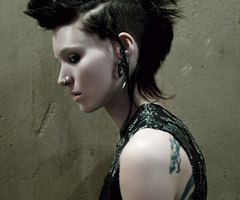"As a girl, she was legal prey, especially if she was dressed in a worn black leather jacket and had pierced eyebrows, tattoos, and zero social status."

The Victim as a Hero:
We all love an underdog story, but have images such as "goth," "nerd," "jock," "prep," etc. become overplayed in media? Wouldn't you agree that people are more multifaceted than these archetypes suggest?
When people describe Lisbeth, the word "badass" is often brought up. She's aggressive and commits to her actions, she's bold; but is her "goth" image necessary? Does it make her more heroic than if she presented herself closer to what is considered social norms?
The quote is used to title this passage suggests that Lisbeth would have been scrutinized far less had she not worn piercings, black leather jackets, and had tattoos, the only thing left for her that would subject her to torment, "legal prey," is the fact that she is a woman. Had she had a different, more socially acceptable appearance, what do you think would happen to her involvement in the plot? The development of her character?
We all love an underdog story, but have images such as "goth," "nerd," "jock," "prep," etc. become overplayed in media? Wouldn't you agree that people are more multifaceted than these archetypes suggest?
When people describe Lisbeth, the word "badass" is often brought up. She's aggressive and commits to her actions, she's bold; but is her "goth" image necessary? Does it make her more heroic than if she presented herself closer to what is considered social norms?
The quote is used to title this passage suggests that Lisbeth would have been scrutinized far less had she not worn piercings, black leather jackets, and had tattoos, the only thing left for her that would subject her to torment, "legal prey," is the fact that she is a woman. Had she had a different, more socially acceptable appearance, what do you think would happen to her involvement in the plot? The development of her character?